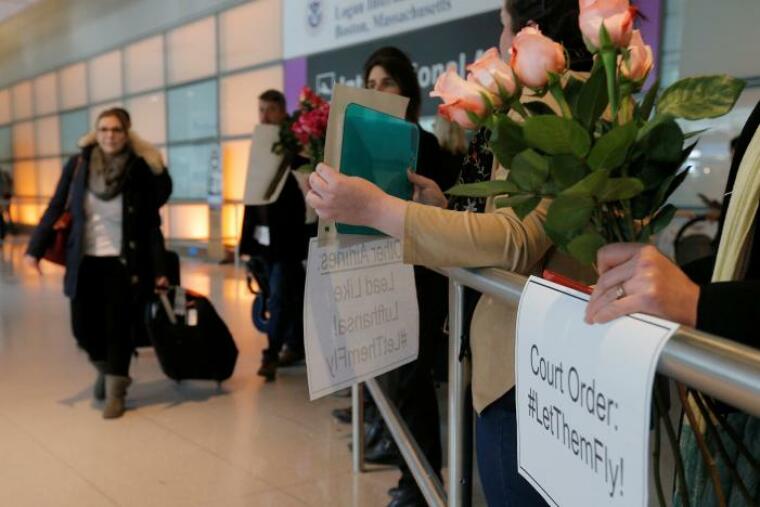Prioritizing religious minority refugees is American tradition, experts say

While many people have raised concerns about President Donald Trump's plan to give preference to Christian refugees who seek to enter the U.S., some religious freedom advocates have said that prioritizing persecuted religious minorities has been the "tradition" of the government in the last century.
In an interview with CBN, Trump said that he sees Christian refugees in Syria as a priority, but critics have voiced their opposition to the president's plans claiming that he intends to give special status to Christians.
On Thursday, an appeals court upheld the suspension on Trump's executive order that bars refugee resettlement for 120 days, but the president said on Friday that the White House is considering to rewrite the order, The Christian Post reported.
Some Christian leaders have warned that the plan to give priority to Christians would exacerbate the problem because it would perpetuate the narrative that the Christian West is at war with Muslims.
However, some religious freedom advocates believe that it would make sense to prioritize persecuted religious minorities, considering that the U.S. Government has declared that the Islamic State has committed genocide against Christians, Yazidis and other minorities in Iraq and Syria.
Andrew Walther, the vice president of communications and strategic planning for the Catholic fraternal organization Knights of Columbus, said that religious persecution is one of the factors in establishing refugee status under American law.
He also pointed out that prioritizing Syrian Christians and other religious minorities has been the stated policy of the Obama administration, although it did not materialize for any of the minority groups in the actual numbers admitted to the U.S.
"In previous cases of genocide, the United States government has prioritized religious minorities who were targeted for genocide, who were refugees, who were displaced, who were in need of humanitarian aid, immigration or resettlement assistance," Walther told The Christian Post.
"What we have is an unbroken history of prioritizing people that have been victims of genocide or targeted for genocide. That is a proud tradition for this country," he added.
Walther also noted that after World War I and World War II, the U.S. government gave preference to persecuted minorities, such as Armenians, who experienced genocide from the Ottomans, and Jews, who survived the Holocaust.
Samuel Tadros, a senior fellow from the Washington D.C.-based think tank Hudson Institute's Center for Religious Freedom said that "there's nothing new about the United States taking religion into account when it's clear that refugees are part of persecuted minority groups."
"Tragically, religion is part of the refugee crises we see around the world right now and that certainly includes what's happening in Syria and Iraq," he told nationally syndicated religion columnist Terry Mattingly.
Archbishop Bashar Warda, the Chaldean Catholic archbishop of Erbil in Iraq, said that he does not think Trump's executive order would make it any harder for the persecuted Christians in Iraq.
He railed against those who were protesting Trump's executive order, saying they were not protesting when tens of thousands of displaced Christians received no financial assistance from the U.S. government or the U.N.
"I do not understand why some Americans are now upset that the many minority communities that faced a horrible genocide will finally get a degree of priority in some manner," Warda told Crux.
 Christians don't have to affirm transgenderism, but they can’t express that view at work: tribunal
Christians don't have to affirm transgenderism, but they can’t express that view at work: tribunal Archaeology discovery: Medieval Christian prayer beads found on Holy Island
Archaeology discovery: Medieval Christian prayer beads found on Holy Island Presbyterian Church in America votes to leave National Association of Evangelicals
Presbyterian Church in America votes to leave National Association of Evangelicals Over 50 killed in 'vile and satanic' attack at Nigerian church on Pentecost Sunday
Over 50 killed in 'vile and satanic' attack at Nigerian church on Pentecost Sunday Ukrainian Orthodox Church severs ties with Moscow over Patriarch Kirill's support for Putin's war
Ukrainian Orthodox Church severs ties with Moscow over Patriarch Kirill's support for Putin's war Islamic State kills 20 Nigerian Christians as revenge for US airstrike
Islamic State kills 20 Nigerian Christians as revenge for US airstrike Man who served 33 years in prison for murder leads inmates to Christ
Man who served 33 years in prison for murder leads inmates to Christ


 Nigerian student beaten to death, body burned over ‘blasphemous’ WhatsApp message
Nigerian student beaten to death, body burned over ‘blasphemous’ WhatsApp message 'A new low': World reacts after Hong Kong arrests 90-year-old Cardinal Joseph Zen
'A new low': World reacts after Hong Kong arrests 90-year-old Cardinal Joseph Zen Iran sentences Christian man to 10 years in prison for hosting house church worship gathering
Iran sentences Christian man to 10 years in prison for hosting house church worship gathering French Guyana: Pastor shot dead, church set on fire after meeting delegation of Evangelicals
French Guyana: Pastor shot dead, church set on fire after meeting delegation of Evangelicals ‘Talking Jesus’ report finds only 6% of UK adults identify as practicing Christians
‘Talking Jesus’ report finds only 6% of UK adults identify as practicing Christians Mission Eurasia ministry center blown up in Ukraine, hundreds of Bibles destroyed: 'God will provide'
Mission Eurasia ministry center blown up in Ukraine, hundreds of Bibles destroyed: 'God will provide' Church holds service for first time after ISIS desecrated it 8 years ago
Church holds service for first time after ISIS desecrated it 8 years ago Burger King apologizes for 'offensive campaign' using Jesus' words at the Last Supper
Burger King apologizes for 'offensive campaign' using Jesus' words at the Last Supper Uganda: Muslims abduct teacher, burn him inside mosque for praying in Christ’s name
Uganda: Muslims abduct teacher, burn him inside mosque for praying in Christ’s name